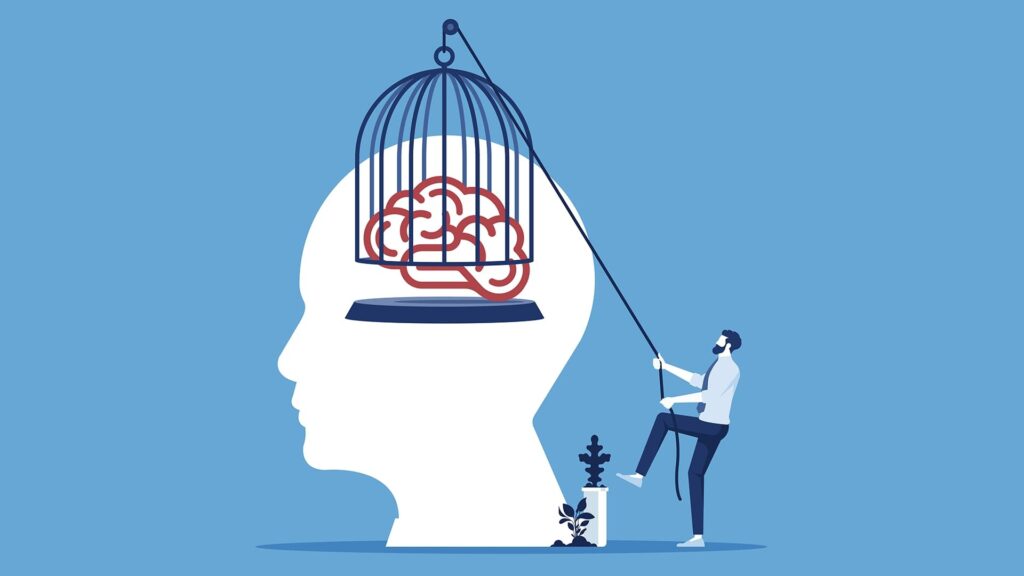Intrusive Thoughts are unexpected, undesirable ideas or pictures that appear out of nowhere like worries, intense ideas, or inappropriate behaviors, and can be weird, disturbing, or even frightening. Though common and generally harmless, these thoughts can be difficult, particularly if repeated frequently. They often occur as a result of mental health issues like OCD or PTSD, stress, or worry.
It’s normal to have intrusive thoughts. Despite their potential for unease, they are normally nonthreatening.
- Simply put, the definition of intrusive thoughts is sudden thoughts or pictures that unexpectedly cross your mind.
- They may be aggressive, or they may involve feelings of embarrassment or inappropriate behavior.
- These thoughts are widespread and impact millions of individuals.
- They often become more stubborn when you try to overpower them.
Are intrusive thoughts normal?

Having intrusive thoughts is quite normal. They happen to almost everyone at some point. Approximately 93% of adults have experienced at least one intrusive thought, according to studies. These are random ideas that don’t represent your actual goals or ambitions. They only become an issue when they disrupt daily living or create anxiety or grief. You can manage them if that occurs by speaking with a mental health specialist.
Another important thing is that although they can happen to persons without these problems, they are frequently associated with stress, anxiety, or mental health disorders like OCD or PTSD.
Intrusive thoughts can also be triggered by significant life stressors or hormonal changes (such as after childbirth).
Moreover, their influence can be lessened by identifying and controlling them, and those who require professional assistance can get it.
Understanding that they don’t define you, accepting them fearlessly, and getting help if they start to interfere with your day-to-day activities are the keys to managing them.
Intrusive thoughts examples

Violent thoughts: Random violent or aggressive thoughts without any intention of acting upon them
Negative thoughts and self-doubt: feelings of lack and low self-esteem.
Health-related thoughts: Fears about illness, germs, or pollution.
Public humiliation: Fear of saying or doing something embarrassing in front of others
Suicidal or death thoughts: ideas of suicide, death, or the worst possible outcomes
Thoughts about safety: Fears that you or your loved ones will be harmed.
Trauma-related thoughts: Repeated flashbacks to unpleasant past events.
Random weird thoughts: Strange, strange, or paranoid thoughts.
Why Do Intrusive Thoughts happen?

Brain Function: the mind continuously processes Information, sometimes randomly.
Anxiety and Stress: Anxious circumstances make intrusive thoughts more likely.
Cognitive Bias: These thoughts are brought on by the brain’s warning of possible dangers.
Mental Health conditions
OCD: Unwanted, repetitive thoughts combined with obsessive actions.
Depression: persistent thoughts about low self-esteem.
PTSD: Flashbacks to traumatic situations.
Postpartum OCD: New parents may obsess over the safety of their unborn child.
Bipolar disorder or schizophrenia: Delusional or paranoid thoughts
Intrusive thoughts and OCD
Unwanted, upsetting thoughts can happen to anybody, but in OCD, they become compulsive and result in compulsive behaviors. These Intrusive Thoughts are more stubborn and anxiety-inducing for those with OCD since they are difficult to ignore.
Fears of infection, injury, taboo thinking, and the need for symmetry or checking are common examples. These thoughts are frequently made worse by attempts to neutralize or suppress them, which feeds the cycle of compulsion and obsession.
Medication (such as SSRIs), mindfulness practices, and cognitive behavioral therapy (CBT) are some treatment options that assist in controlling symptoms and lessening the influence of intrusive thoughts.
Ways to Control Intrusive Thoughts

- Acknowledge and Accept Them
- Recognize that they are only thoughts and not facts.
- “It’s just a thought, not a fact,” remind yourself.
- Don’t argue with your thoughts.
- They may become stronger if you push them away.
- Allow them to go by organically.
Do Mindfulness Practices
- Breathe deeply and meditate.
- Take up hobbies like art, or exercise.
- CBT or cognitive behavioral therapy
- CBT can reduce intrusive thoughts by 60-80% over time.
- Seek Professional Help If Needed
If Intrusive Thoughts cause distress or disrupt daily life, consult a therapist.
Medication (SSRIs) may help in severe cases of OCD, anxiety, or depression.
Nonetheless, having intrusive thoughts is natural and usual.
They don’t characterize a person. They can be lessened by managing stress and going to treatment. Furthermore, those who suffer from uncomfortable intrusive thoughts regularly can seek professional assistance.













